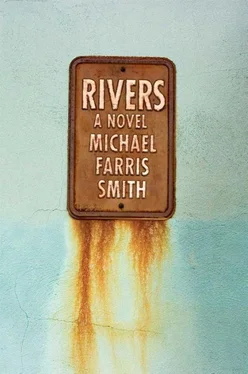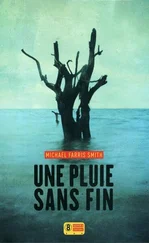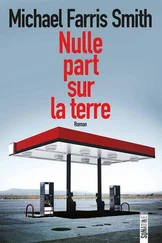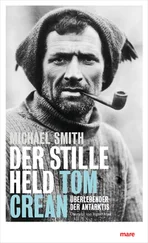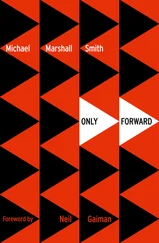“I’ll decide it,” Big Jim called. He came down the staircase, careful seconds between each step. When he was down on the second floor, he stepped across the men and the slow spread of blood in the doorway and then he looked at Evan and Brisco. Big Jim wore overalls with no shirt underneath and only one shoulder strapped. He held a shotgun pointed from his hip, but he let it down when he saw the boys. He shook his head.
Brisco sat up. His face was red and he wiped at it with the bed-sheet. Evan started to speak but an explosion-like crash sounded below as the storm hurled something through the large café windows. Big Jim jerked with the big noise and disappeared down the staircase.
“Stay here, Brisco,” Evan said as he went to get up to go with Big Jim. But Brisco held on to his coat and was pulled across the bed. “Don’t leave me!” he yelled.
Evan grabbed his little brother, lifted him to his feet, and stood him on the bed. “You got to stop crying. Okay? I ain’t going nowhere I swear it. You got to stop crying and yelling. It ain’t easy but we got to.” He wiped the boy’s face with his hands as Brisco huffed and tried to suck it in. “Don’t look at nothing, Brisco. Just look at me. Look at me.”
Brisco put his eyes on his brother and Evan told him to count. Start counting and see how high you can go and look at me. Brisco nodded and said, “One.” Then he stopped.
“Keep going. How high can you get? Count and calm down. Come on.”
The boy started over with one, then moved to two, three, and he continued. Evan held him by the arms, waited until Brisco had reached seventeen, eighteen, and then let go of him and backed away, over to the dead men.
“Look up,” Evan said. “Watch the ceiling and keep going. I bet you can’t go to fifty.”
As Brisco looked up and counted, Evan grabbed the man with the birthmark by the ankles and dragged him through the bathroom and into the other bedroom, leaving a trail of red as if the room had been crossed by a bloody mop.
“Keep going. Eyes up,” he called out to Brisco as he returned to the doorway. Brisco was somewhere in the thirties and back to the twenties, confused but trying to make it work. The other man was heavier and Evan had to wrestle him around to get turned where he could drag the body, but he managed and laid him next to the other one in a sloppy, bloody mess. He took a blanket from the bed and covered them and then gunshots sounded out across the square.
In the other room, Brisco lost count and screamed, “I can’t do it no more.”
THEY LAY IN THE MUD, still and submissive. Mariposa moved underneath Cohen and he lay mostly on top of her, their faces down, their heads rested on folded arms. The headlights from the U-Haul had gone out and all was black. The rain beat them, the wind swooshed through the remaining trees along the creek bank, and they could only hope that nothing came crashing down on them. It was as if they were being returned to the earth, driven into the ground by the force of the storm, their stiff bodies less skin and bone and more mud and root with each passing moment. Mariposa tried to think of colors, of reds and oranges and yellows and greens or anything that would strike against the black canvas of the world that she saw when she closed her eyes or opened them. The colors came and went and she tried to imagine brilliant stars and a crescent moon but nothing would stay.
In a couple of hours, the black world weakened. Cohen got off her, got to his knees, and helped her do the same. They climbed to their feet holding on to one another.
In the morning gray, they headed back toward the collapsed bridge. The flooded creek raged on and the truck cab had become dislodged from the tree sometime during the night. The trees thinned and disappeared and the wind blew at their backs and they walked methodically with hunched, depleted bodies and rain-soaked souls. Sometimes they stopped and knelt and then encouraged one another and then rose and walked again. They had been washed along in the cab much farther than it seemed and once or twice they wondered if they were going the right way. They had been flipped and tossed and turned and spun and it would have been easy to lose sense of direction. Cohen said, “Let’s give it another minute or two and if we don’t see the road and the other truck, we’ll turn around.”
The storm had not passed on but had relented some. The rain had eased with the dawn and the winds had also given way and no longer threatened to push them to the ground. They helped one another along another quarter mile and then Cohen said, “There it is.” At first sight, Mariposa buckled and dropped to her knees. Cohen went down with her, telling her, “It’s right there. It’s right there.” She nodded and knew it was right there but it seemed to her that the sight of the truck was simply a prolonging of the end of things.
“I can’t,” she said.
He understood but it didn’t slow him. He stood and moved behind her and lifted her underneath her arms. Her rag-doll legs wouldn’t take her weight and Cohen yelled, “Come on, goddammit. We ain’t doing this shit right here.”
He shook her and she planted her feet and twisted from his grasp.
Cohen pointed and said, “Let’s go. You can cry in the truck.”
“I ain’t crying in the truck.”
“You’re not crying here, either.”
“I know it,” she said and she stood taller and moved again, walking faster. Cohen followed and her energy rose as they splashed across the flooded fields with high knees, fueled by the disgust of having to keep on.
When they made it to the truck, Cohen helped Mariposa in the passenger side and then he went around and got behind the wheel. They sat and slumped. The adrenaline gone. The hunger and thirst and weariness and disgust still there.
Cohen looked at his hands. The skin was tender from so much water. Hers were the same. Mariposa stared blankly at the windshield, her arms dropped at her sides. Trails of water from their clothes and bodies ran across the bench seat of the truck, down their legs, and across the floorboard. It was as if they were melting. They sat and the water ran from them and their bodies seemed incapable of movement. Their minds incapable of thinking about anything other than rain and thunder and wind.
They sat with the earliest, dullest light of day. Cohen moved first. He opened the truck door and stood outside and peeled off his jacket. He tossed it in the back of the truck and got in. Mariposa sat up and leaned forward and he helped her get her coat off and he dropped it on the floorboard. She fell over then and lay across the bench seat with her hands folded in prayer and her head resting on them. Cohen leaned on the door with his head against the window. They were both out within seconds.
THE STORM HAD RAVAGED WHAT was left of the town. Storefronts were blown out and the awning had been torn from the square buildings and landed in trees and in upstairs windows. Water had stopped draining and was pooling shin-deep across the square and across the sidewalks, and trash and tree limbs and liquor bottles and clothes and dead animals and God knows what floated in the water. The water had crept into the buildings and covered floors and was slowly rising as the rain kept on.
Evan and Brisco had spent the storm in the storage room of the café, sitting underneath a stainless-steel table with thick legs. Big Jim had sat along the back wall of the café, shotgun pointed where the windows used to be, waiting on them to come as soon as there was the slightest break.
The slightest break came with daylight. A stiff wind and the heavy rain continued but it wasn’t the part of the storm that scared anyone. Heads began to poke out of windows and out from behind doorways and around the edges of alleys and what they discovered was access. Soon there were packs of them going into buildings and coming out with whatever they could carry. Furniture and picture frames and toilet seats and boxes they hadn’t even opened to see what was inside. The looting came with howls of victory, as if the discoveries were of priceless treasure that could dictate fate and not worthless remnants of a once normal life.
Читать дальше
